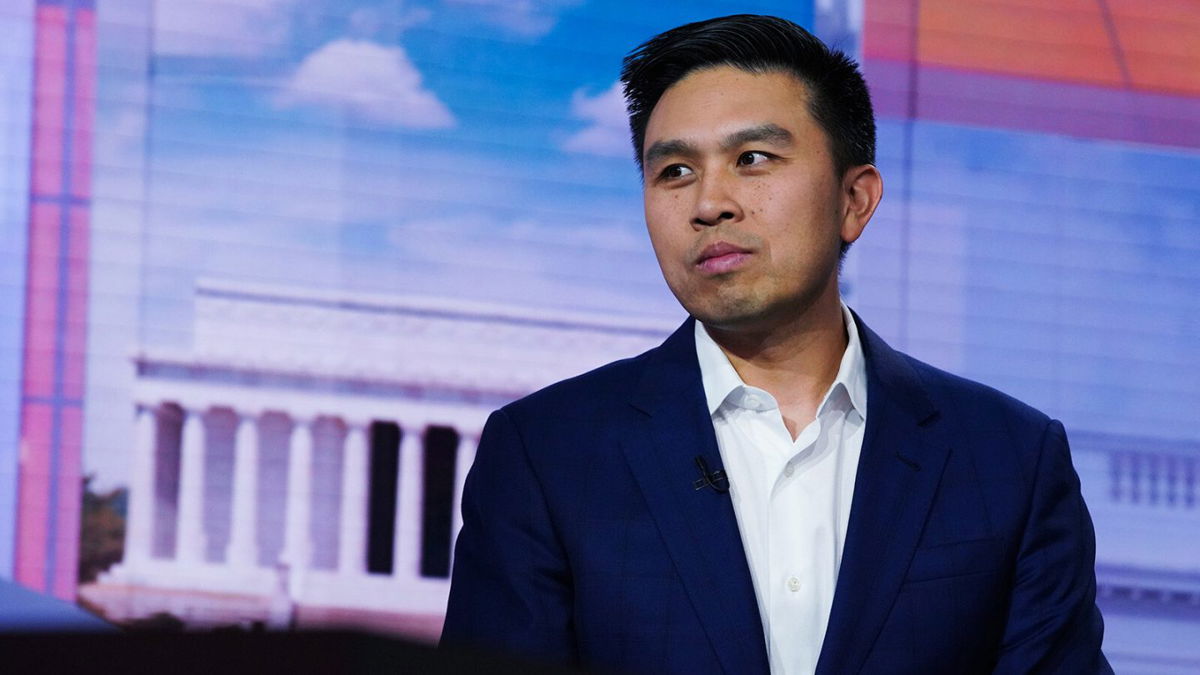Republican policy guru wants to end California’s ‘one-party monopoly’

Lanhee Chen listens during a Bloomberg Television interview on Monday
By Maeve Reston, CNN
California Republicans have been struggling in the political wilderness, failing to capture a single statewide office since 2006 in a state where Democrats outnumber them two-to-one. But longtime GOP policy adviser Lanhee Chen is hoping to change that at a time when the recall election of Democratic Gov. Gavin Newsom is reenergizing the party’s voters.
Chen, a fellow at the Hoover Institution who guided the policy agenda for the presidential campaigns of Mitt Romney and Marco Rubio and was a health policy advisor on the re-election campaign of former President George W. Bush, is launching his 2022 bid for state controller Tuesday.
Seeking an office that he acknowledges is decidedly wonky, the academic with four degrees from Harvard is determined to convince California voters that Democrats’ one-party rule is leading to “policy sclerosis.” He is centering his campaign on accountability and his desire to drive “creativity in thinking” when it comes to California’s biggest problems — including homelessness, water issues and the soaring cost of living.
“Everybody’s political interests in Sacramento are aligned with one another, so there’s nobody there to hold anybody accountable,” said Chen in a recent interview in Los Angeles about an hour away from the Rowland Heights suburb where he grew up as a devoted Lakers and Dodgers fan. “If you are a member of the one-party monopoly in Sacramento, your incentive is to make other Democrats happy and that creates a situation where you don’t dig any deeper.”
Chen is entering the race early and, so far, doesn’t face competition from any other prominent Republicans. Democrat Malia Cohen, who serves on the state board of equalization, has also announced a bid for controller.
Chen says he would harness the power of the controller’s office to dig into why California is directing tens of billions of dollars toward homelessness, for example, “yet it doesn’t seem to be improving in big cities like LA and San Francisco.” He wants to do a thorough audit of how the state is using its Medicaid dollars and is eager to investigate how the state’s Employment Development Department ended up paying as much as $30 billion in fraudulent claims.
“I don’t view this campaign through an ideological lens; I view it through a lens of competency. Basic competency,” he said, noting that the controller has the power to independently initiate audits not just of the state government, but also local governments if state money is involved. “I think people will see my background as somebody who spent a lot of time thinking about how to solve big problems and carried through on that.”
Chen is cognizant of the steep challenge that exists for any California Republican vying for statewide office given the state’s ideological makeup. But he notes that there is a model among GOP candidates in California who have succeeded in recent Congressional elections in tough districts, including US Reps. Mike Garcia, Young Kim and Michelle Steel. They won, in part, he argues, because they represented different life experiences and backgrounds, and he wants to be part of that conversation as the son of immigrants from Taiwan.
Chen’s father came to the US in the 1970s to finish his medical training as a doctor; and his mother to pursue a graduate degree in chemistry. He was born in Fayetteville, North Carolina, where his father was a doctor.
The family eventually moved to Rowland Heights with “the dream of a nice house, a backyard and great weather,” he said. His parents’ experience helped shaped Chen’s view that there should be a “pathway to legalization” for immigrants, which he defines as “a form of legal status” where they are not living in the shadows and are able to “participate fully in society.”
Chen believes one of the problems that has faced statewide GOP candidates in recent years is that they haven’t been “the right messengers,” in part because they haven’t represented the diversity of California and “the kinds of people who Californians can relate to.”
“We have to be able to advance creative ideas that respect center-right conservative values or priorities, but that are in tune with where we live and where we are,” he said.
Chen said he will be voting to recall Newsom in the September 14 election, though he has not decided which Republican candidate he will support.
He rejects former President Donald Trump’s efforts to undermine Americans’ confidence in the 2020 election: “Joe Biden was elected, and that’s that.” But with a smile, he sidestepped a question about whether he voted for Trump, who is deeply unpopular in California: “I am looking forward, I’m not looking backwards.”
The-CNN-Wire
™ & © 2021 Cable News Network, Inc., a WarnerMedia Company. All rights reserved.